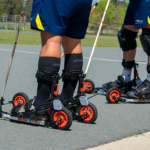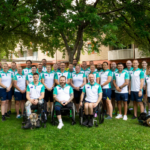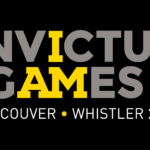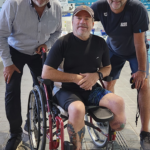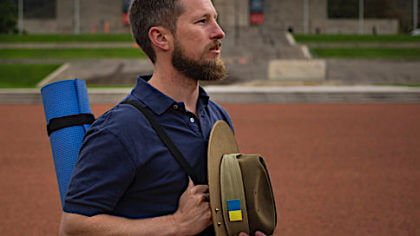
Think Yoga’s not for you?
Next time you walk past a yoga studio and think, ‘yoga isn’t for me’…think again. It may change your life.
Just ask Chris Thompson-Lang.
The Australian Army veteran was on his way to the pub when he walked past a yoga studio. An introductory offer prompted him to change course.
A life-changing decision
That decision would alter the direction of Chris’ whole life.
“Yoga has promoted a level of choice in my life that has seen me have better relationships, better nutrition, better intimacy and more enjoyment each day,” Thompson-Lang said.
As an engineer in the Army, Chris experienced peace keeping and combat deployments and was medically discharged after 14 years of service.
Although proud of his time in the military, Chris was a changed man.
Bringing back purpose
“I really struggled to adapt to life back in Australia, I struggled to communicate with my wife and children. I was having a lot of nightmares, just struggling to function,” he said.
“My experience isn’t uncommon.”
Yoga brought purpose back to Chris’ life.
“Yoga has been a game changer. I used to be so reactive. I’d lose my shit at the smallest things and respond in ways that were anti-social. It was a product of conditioning to respond with aggression,” he said.
A good fit for veterans
Self-discipline is ingrained in service personnel and Chris believes it makes yoga a natural fit for veterans.
“Yoga has enabled me to exercise pure controlled aggression. I can switch on or off at will, whist maintaining complete situational awareness. Previously I’d experience tunnel vision under stress and rely on instinct,” Thompson-Lang said.
On the Frontline: from student to teacher
After 18 months as a student, Chris took the first steps to becoming a yoga teacher. He’s now a senior teacher trainer and on a mission to enlighten other veterans.
The organisation Frontline Yoga offers free classes to military personnel and frontline professionals (that includes all first responders including current and ex-serving police, fire, ambulance, healthcare workers, lifesavers, RFS/SES and volunteer paramedics), with a focus on resilience, strength and connection. The classes are particularly suitable for people who live with chronic stress, depression, anxiety and post-traumatic stress.
With International Day of Yoga celebrated in June, we asked Chris to explain the basics of Yoga and why it might be a good option for you.
1. What is yoga all about?
Modern Yoga is a training system that was designed to prepare Indian warriors for combat. It incorporated ancient practices that developed strength, endurance and supplely. The physical practice of yoga involved moving every muscle and every joint in every direction every day. It increases range of movement, encourages circulation and stimulates the healthy flow of chemicals (hormones) within the body. As a philosophical practice, it leads the student in recognising the distinction between the things we can and cannot control. It helps to create a space between stimulus and response. Promoting conscious choices over reactivity.
2. What skills /fitness level do you need to get started?
Anyone can start. Frontline Yoga is focussed on being accessible to everybody. It considers the most common injuries experienced by veterans and provides suitable modifications. Any good yoga teacher will be able to support beginner students and offer variations to progress them towards a deeper practice. That’s why we say “practice” yoga, rather than “do” yoga.
3. Why is yoga a good option for veterans?
Like other Frontline professionals, veterans have committed their lives to service. Often putting the job or mission above their own comfort or physical security. Yoga is for warriors. It’s a means of deeply restoring the nervous system and maintaining physicality.
4. What advice would you give to veterans who might be looking to give yoga a try, but not sure how to start?
Don’t worry If you can’t touch your toes. Nobody begins yoga ready to “perform” the postures. It’s a gradual process to learn about how your body feels when you take in different directions. Be courageous and then be patient. You don’t have go all the way on your first day. Remember it’s a practice. It takes months, years and even decades to reach the full expression of most postures. Moving towards them is where the magic happens. Not only does yoga help control the body, it helps reign in the uncontrolled mind.
5. How does yoga support your mental and physical wellbeing?
Breath-centred movement reminds students how to use their inhalation and exhalation to guide the body. Similar to marksmanship, breathing cycles are critical. Breath influences the stimulation or suppression of stress hormones. During a yoga class, breathing is guided to suppress stress hormones and engage deep restoration through the para-sympathetic nervous system.
Are you ready to try yoga?
VSA provides sport and recreation financial assistance to veterans and their families – contact us to find out if you’re eligible for support to cover the cost of yoga equipment, apparel or studio memberships.
